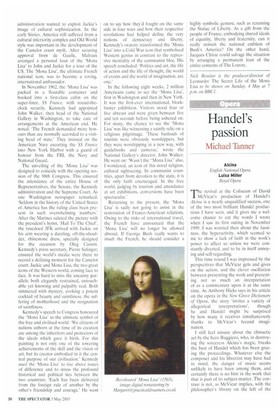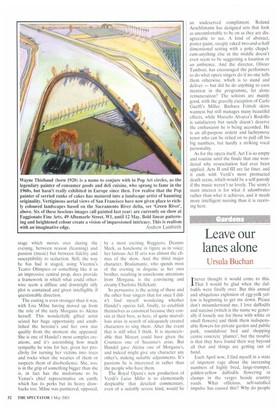Handel's passion
Michael Tanner
Alcina English National Opera Luisa Miller Royal Opera
The revival at the Coliseum of David McVicar's production of Handel's Alcina is a nearly unqualified success, one of the two most brilliant Handel productions I have seen, and it gives me a welcome chance to eat the words I wrote when I saw its first outing in November 1999. I was worried then about the fussiness, the hyperactivity, which seemed to me to show a lack of faith in the work's power to affect us unless we were constantly diverted, and to be in itself annoying and self-regarding.
This time round I was impressed by the perspectives that McVicar gets and gives on the action, and the clever oscillation between presenting the work and presenting not so much an interpretation of as a commentary upon it at the same time. As Anthony Hicks says in his article on the opera in the New Grove Dictionary of Opera, the story 'invites a variety of
allegorical interpretations', though he and Handel might be surprised by how many it receives simultaneously thanks to McVicar's fecund imagination.
I still feel unsure about the climactic act by the hero Ruggiero, who, in destroying the sorceress Alcina's magic, breaks the bust of Handel which has been gracing the proceedings. Whatever else the composer and his librettist may have had in mind, the danger of music seems unlikely to have been among them, and certainly there is no hint in the work that that is part of its subject-matter. The contrast is not, as McVicar implies, with the philosopher's library on the left of the
stage which moves over during the evening, between reason (learning) and passion (music) but between fidelity and susceptibility to seduction. Still, the way he has had it staged, using Vicenza's Teatro Olimpico or something like it as an impressive central prop, does provide a framework in which what could otherwise seem a diffuse and downright silly plot is contained and given intelligible if questionable direction.
The casting is even stronger than it was, with Lisa Milne having moved up from the role of the tarty Morgana to Alcina herself. This wonderfully gifted artist seized her huge opportunity and established the heroine's and her own star quality from the moment she appeared. She is one of Handel's most complex creations, and it's astonishing how much sympathy he wins for her, given her proclivity for turning her victims into trees and rocks when she wearies of them or suspects them of disobedience. She, too, is in the grip of something bigger than she is, in fact has the misfortune to be Venus's chief representative on earth, which has its perks but its heavy drawbacks too. Milne was partnered, opposed, by a most exciting Ruggiero, Deanne Meek, as handsome in figure as in voice; her famous Act II aria was almost the climax of the show. And the third major character, Bradamante, who spends most of the evening in disguise as her own brother, resulting in unwelcome attentions from Morgana, is the convincing and creamy Charlotte Hellekant.
So persuasive is the acting of these and the other four singers that for once I didn't find myself wondering whether Handel's operas fail, finally, to establish themselves as canonical because they consist at their best, as here, of quite marvellous arias in search of adequately created characters to sing them. After the event that is still what I think. It is inconceivable that Mozart could have given the Countess one of Susanna's arias. But Handel gave Alcina one of Morgana's, and indeed might give any character any other's, making suitable adjustments. It's passions he is interested in rather than the people who have them.
The Royal Opera's new production of Verdi's Luisa Miller is so elementarily despicable that detailed commentary, even of a suitably severe kind, would be
an undeserved compliment. Roland Aeschlirnann has designed sets that look as uncomfortable to be on as they are disagreeable to see. A kind of abstract, poster-paint, steeply raked two-and-a-half dimensional setting with a poky chapelcum-anything else in the middle doesn't even seem to be suggesting a location or an ambience. And the director, Olivier Tambosi, has encouraged the performers to do what opera singers do if no one tells them otherwise, which is to stand and deliver — but did he do anything to earn mention in the programme, let alone remuneration? The soloists are mainly good, with the gravelly exception of Carlo Guelfi's Miller. Barbara Frittoli skirts wanness but still manages many beautiful effects, while Marcelo Alvarez's Rodolfo is satisfactory but surely doesn't deserve the enthusiasm he is being accorded. He is an all-purpose ardent and lachrymose tenor who can be relied on to pull off his big numbers, but hardly a striking vocal personality.
As for the opera itself, Act I is so empty and routine until the finale that one wondered why resuscitation had ever been applied. Acts II and III are far finer, and it ends with Verdi's most protracted death scene, which would be a self-parody if the music weren't so lovely. The score's main interest is for what it adumbrates rather than what it achieves, and it needs more intelligent nursing than it is receiving here.











































































 Previous page
Previous page